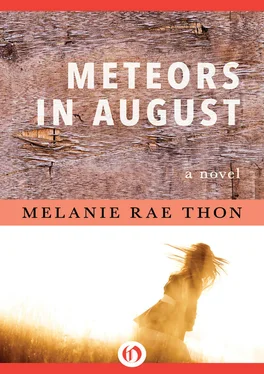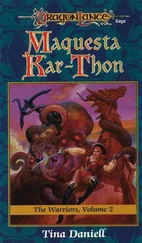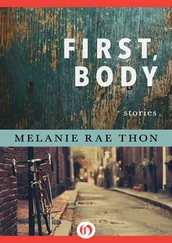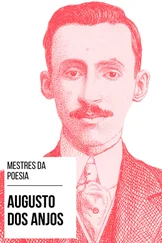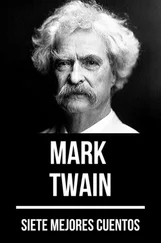That’s just how it happened too, except that she didn’t eat quite half the pie because Daddy was chewing even faster than she could. Later he shuffled out to the porch. Weeks in bed had made him lame; he’d spend a month shaking old age out of his legs. He said he smelled the wind changing. We were in for a cool night. But in the kitchen where Mom and I cleared dishes around the sleeping girl, the air was close and hot.
I heard the lone coo of an owl. It reminded me of the old days when there were always boys whistling in the grass. But tonight’s cries went unanswered; the girl slept, the food in her stomach heavy as a drug, a drug that kept her safe from the story a boy with no arms wanted to tell.
MOM AND I sat on the back steps in the dark. My father was right: the wind was changing, blowing the stars out of the night, leaving the sky heavy with yellow fog. In the kitchen, Nina cried out. I ran inside and flicked on the light. She jerked straight up in her seat as if to pretend she hadn’t been out cold for the past three hours. We heard Daddy limping up the stairs, on his way to bed.
“I guess he’s better,” Nina said.
Mom was right behind me. “Because of you,” she said.
“All I did was be alive.”
“That’s no small thing.”
Nina stretched her arms over her head. “Is there any more of that pie?”
“Your father finished it.” Mom reached for Nina’s hand, but Nina stood up to shake off sleep and the dream that had made her yell.
“I hope you can forgive him,” Mom said.
“For eating the pie?”
“For what he did before.”
“You mean for telling me he never wanted to see my face again? You mean for nearly breaking my jaw? You mean for calling me a piece of trash and a worthless slut and no daughter of his from that day forward?”
Mom nodded, ashamed, as if they were her words, not my father’s.
“Hell,” Nina said, “that was nothing. I don’t blame him. I could have let him cool down for a month or two and shown up on your doorstep. With my belly the way it was, he never would have hit me. I chose my life. Nobody ruined me and nobody’s gonna save me, either. Shit, I bet Rafe Carson blames his father for wrecking his life, making him run away. But Rafe didn’t have to steal no fifty dollars. He could have earned it in a week. He was looking for an easy way and you can see where it got him.”
“What did happen after you left here?” Mom said.
Nina hummed a snatch of song. “I think it’s cooler tonight,” she said. “Smells like rain.” She twirled on her toes. “Wouldn’t that be something? Rain. Now, that would be a miracle.”
“Please,” Mom said, “tell me.”
Nina leaned against the stove, sighing like a girl who’d been dancing all night. “Don’t make me think of all that now.”
“But you’ll leave—”
“Yes, in the morning.”
“—and I won’t know anything about you. You’ve been wandering around in my head for five years, Nina, like some dead girl who can’t rest.”
Nina fell into her chair. “I’m not dead, Mama, but sometimes I’m afraid to lie down. I can’t sleep in a bed without it getting narrow in my dreams, without a lid slamming shut on me. I can’t hear a sound — my ears are full of water. I see Jesse. Remember how white he was? Like he didn’t have any blood.” She held out her hands, exposing the underside of her forearms. “Look at me,” she said. “Look how pale I am.” And it was true. That skin was as white as the underside of a fish.
The girl in the airplane pressed her face up to the glass, stunned and silent, awed by her own death. Even Myron Evans who chose his time must have been startled when it finally happened. He didn’t know death would be a hard slap, a boot in the back, knocking him off the chair — no, he was hoping death had arms to hold him, fingers to smooth his hair, lips to kiss his eyes closed, good-night for the last time.
Nina put her head down on the table. “No,” Mom said, shaking her, “you can’t sleep now. You have to tell me.”
“Tell you what?” She sounded groggy already. She was afraid of her dreams, and still she longed for them.
“What happened to Billy? What happened to the baby?”
“Oh that , that was so long ago.” She looked around the room as if she expected someone to walk in the door and tell the story for her. “Lizzie,” she said, “could you make your old sister some tea?” I nodded and she smiled at me as if I’d just done her a great kindness. Her gratitude mocked me. All these days I’d been wishing she would go away and leave me with my visions of my sister, and the only thing she wanted from me was a cup of tea.
“Why did you go with that boy?”
“He touched me right.”
“That’s no reason.”
“It was to me. The boys before Billy made me feel like a heap of damp ground. They couldn’t wait to get their hands under my clothes, but I could have been anybody in the dark — I could have been a pig tied down tight for all they cared. Not Billy. He had a way with his hands. Once a wild canary landed in his palm, and his fingers closed around her so slow that she was stunned and didn’t try to fly away. He called me his yellow bird. He said my heart whispered to his hand. He said if I left with him, he’d fill my house with birds — owls to coo us to sleep, peacocks to parade in the yard, a rooster to wake us at dawn. But I woke one day and realized a house of birds has walls of feathers that fly away the first time the wind blows. I woke up on the reservation and saw my house just as it was: a plywood shack with a roof of corrugated tin where the birds never landed, where the sound of rain on metal could make you go mad. Nobody sang to me, but my whole body was awake with sound, and the sound was my baby’s cry. I heard it so deep I thought my bones were sobbing.
“Billy rubbed my breast with his callused fingers, telling me, ‘Amos is awake,’ as if I didn’t know. He poked at me, using a touch he’d learned somewhere else with a woman who liked it hard and fast, good-night. Those fingers had forgotten how to tempt birds. That palm could have rested flat on my chest without feeling the beat of my heart. He was bored with me. He’d already found some dark-skinned lady who made him laugh and didn’t expect too much. This was February, the first year. I already saw myself leaving.”
The teapot whistled and I leaped out of my chair. Nina snorted. “Everybody has to answer to something,” she said. I put the pot and the cups on the table, and Nina kept talking. “I told Billy I couldn’t stand that filthy crook in the road they called a town, that rathole he called a house. I wanted curtains to hang in my windows instead of sheets. I wanted a car that ran instead of a rusty pickup with no tires, sunk in the mud of our yard. I wanted to live where people painted their houses white and yellow and gray instead of turquoise and flaming pink. I never wanted to see another trailer turned into a house again. I said we were moving to Missoula to live like decent people. ‘Like white people,’ he said, ‘isn’t that what you mean?’ And I said, ‘Yeah, what’s wrong with that?’ And he said, ‘You’ll see.’
“So we did move, stayed almost a year, but Billy couldn’t keep a job. He said folks didn’t trust Indians; I said he made his own misery expecting people to treat him wrong.
“One night I was doing the dishes. Billy patted me on the butt and said, ‘I’m goin’ out for cigarettes — you need anything?’ ‘Milk,’ I said, ‘for Amos.’ He was gone an hour and I started to wonder. Sometimes the neighborhood kids waited in the alley and ran at him with sticks.
“There was only one other explanation. I’ll tell you the truth: I wanted to believe he’d been beaten more than I wanted to believe he’d left me that way, with a pat and a lie. Things weren’t too bad by then. He’d had the same job for two months. We’d saved nearly fifty dollars. He didn’t like heaving garbage, but nobody gave him a bad time. ‘All garbage men look dirty,’ he said, ‘so they don’t notice me. And there’s nothing to steal.’
Читать дальше
